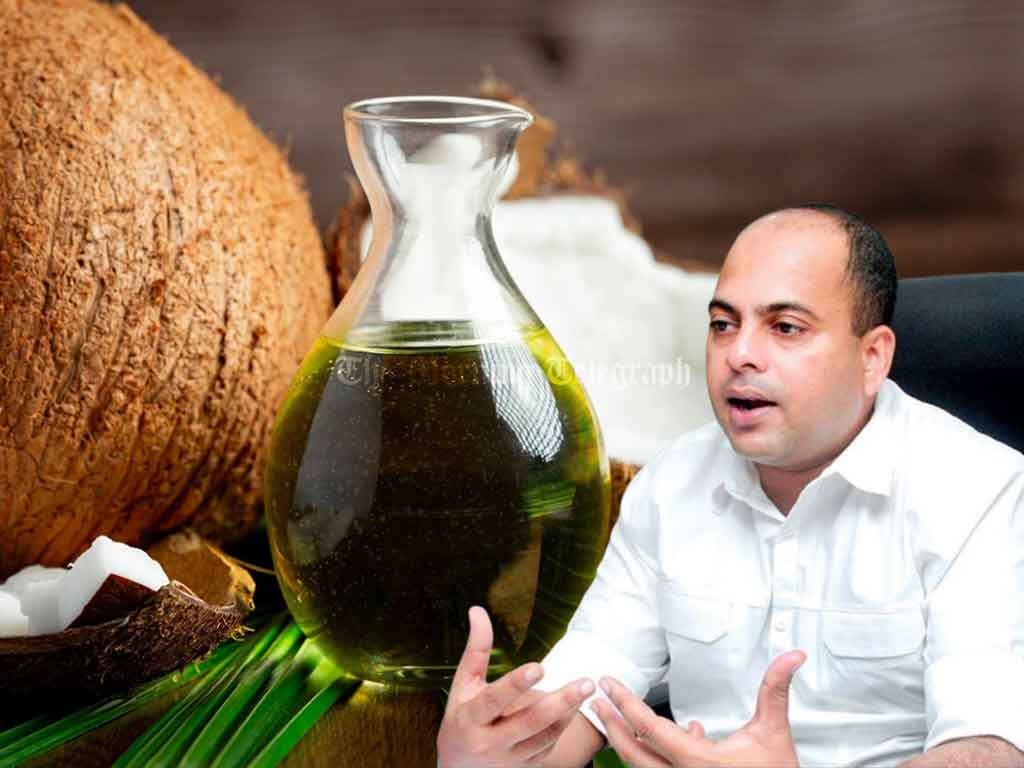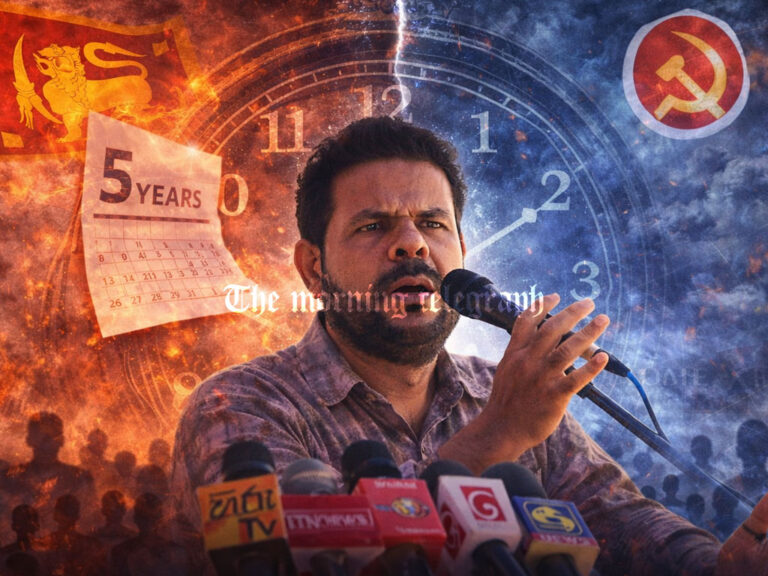
Samagi Jana Balawegaya MP S.M. Marikkar says that coconut oil tax fraud is happening even under the current regime.
He expressed these views at a media conference held in Colombo.
In recent days, the media had reported that several companies had stolen about Rs. 5,000 crores of tax revenue due to the government through the import of unrefined coconut oil. The Divaina newspaper had reported it. The Sunday Times had reported it, and the Maw Rata newspaper had also reported it in detail.
When I was looking into this, this tax fraud occurred from January 1, 2024, to the end of October. Before January 1, 2024, when importing unrefined coconut oil into Sri Lanka, it was taxed at Rs. 125,000 per metric ton under the special commodity levy and Rs. 150,000 per metric ton for refined coconut oil. The gazette clearly states that this does not fall under the VAT category. According to the special gazette on VAT published on January 1, 2024, this is no longer included in the list of VAT exemptions. That means the importers are required to pay VAT.
However, it is reported that several companies, especially those dealing in unrefined coconut oil, have imported 38.8 million kilograms. One company imported 12.9 million kilograms, another company imported 1.4 million kilograms, a third company imported 624,000 kilograms, another imported 18.8 million kilograms, and yet another imported 4.23 million kilograms. According to the gazette, 18% VAT and 2.5% Social Security Tax should have been paid for these imports. This means that on these 38.8 million kilograms, 20.5% tax per kilogram has been evaded.
The notable thing about this is that one of the companies that imported this oil had sent a letter to the then-President Ranil Wickremesinghe on July 17, 2024. The Department of Public Fiscal Policy also wrote a letter to the Department of Inland Revenue in response.
The letter was a request for a policy direction on the application of the exemption of Value Added Tax (VAT) on imported crude coconut oil subject to the Special Commodity Levy (SCL) and its supply to the market as refined coconut oil.
This refers to the letter dated July 17, 2024, addressed to His Excellency the President by the Managing Director of the company.
Then what does this mean? This company has requested a concession from former President Ranil Wickremesinghe, essentially requesting not to pay taxes. The Department of Fiscal Policy forwarded this to the Department of Inland Revenue on July 31, 2024. Subsequently, the Department of Inland Revenue sent their observations to the Department of Fiscal Policy on August 29, 2024. At the end of the observations, it stated:
“Therefore, IRD is in a position that the company’s imports of crude coconut oil to Sri Lanka and its manufacturing of refined coconut oil constitute a process of manufacturing, and the supply of refined coconut oil is liable to VAT with effect from January 1, 2024.”
It further stated:
“IRD recommends that the observations from the company should also be taken into account when formulating any policy direction on this matter.”
If there is a law in the country and that law has been implemented through a gazette, then all companies importing these goods are subject to that law. Where do these companies ask whether they should pay tax or not? When have they asked? Should they even ask? Even if they ask, what is the answer to this company?
The company should either import and sell without refining it—because the special trade tax is levied at the time of import—or they must pay VAT once the product is refined and sold. If they claim to sell without refining, there is a significant health concern.
There are two issues here: either the companies are selling unrefined oil, or they have evaded VAT. What stands out is that this fraud is happening under the government of Ranil Wickremesinghe. Tax concessions were sought from him, and the Department of Public Fiscal Policy directed the matter to the Department of Inland Revenue. Even after Ranil Wickremesinghe left the presidency, this practice appears to have continued.
According to our information, these companies continued importing large quantities of coconut oil in November as well. We will find out the quantities imported in October, November, and December soon.
We want to hear from those who came to stop fraud, theft, and corruption—those who claimed they would catch tax evaders and the people who robbed banks—how this theft has continued under their governance. The media has been reporting this issue consistently. Will this be allowed to continue?
This is similar to the Central Bank bond scam. It is said that Rs. 150 million in illegal profits were made in ten months, which equates to approximately Rs. 60 million in twelve months.
Who benefitted from these illegal profits? Did the companies alone enjoy them, or did they share them with others? The government must immediately reveal the truth. Questions should be raised in Parliament regarding this matter.
What is the government’s answer to this? Will it take action to recover these unpaid VAT taxes, or will it continue to allow such tax evasion?
Before the election, promises were made about reducing electricity and water bills, but none of these have been fulfilled. The Oil Corporation, Electricity Board, and Water Supply Board, which are among the top 10 profit-making institutions, have not provided any relief to the public.
The Electricity Board Act states that the institution should manage costs, not generate profits. Yet, the Electricity Board has made a profit of approximately Rs. 139 billion, which should have been used to help those below the poverty line. Instead, it has gone unused.
Similarly, promises to reduce oil prices remain unfulfilled. Taxes that were to be removed have not been addressed.
When the government opens its mouth, it only offers complaints. As the opposition, our responsibility is to remind them of their promises and hold them accountable.
We will not allow tax evaders to operate freely. If the government claims to be free of corruption, it must act now. We await their response.




